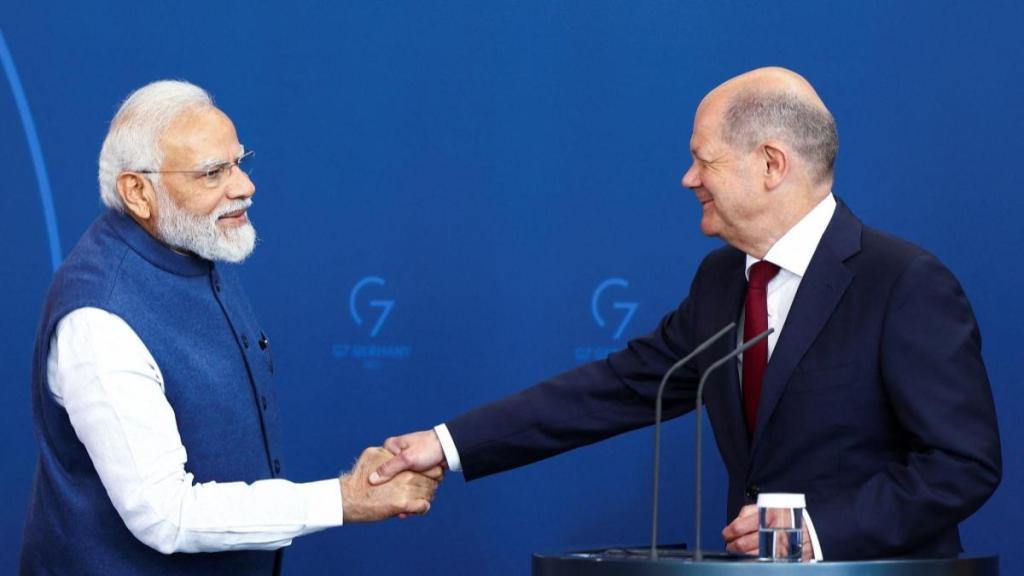India and Germany are set to hold high-level talks later this week, with defence, trade, renewable energy, mobility, and skilled migration topping the agenda. These discussions come as part of the 7th Intergovernmental Consultations (IGC), which will see German Chancellor Olaf Scholz visit India from October 24 to 26, 2024, at the invitation of Prime Minister Narendra Modi. The IGC serves as a framework for ministers from both countries to discuss and collaborate on various sectors, reporting their findings and proposals to the heads of government.
The upcoming talks come at a crucial time, as both nations seek to strengthen their already robust bilateral ties. The visit will focus on fostering collaboration in several critical areas, including defence cooperation, enhanced economic partnerships, renewable energy, and the mobility of skilled professionals. The two countries have a longstanding strategic partnership that dates to 2000, and the upcoming consultations are expected to deepen this relationship across multiple sectors.
Defence and Security Cooperation
Defence cooperation will be a key focus during Chancellor Scholz’s visit. Germany and India have been working to expand their military collaboration in recent years, with an emphasis on bolstering their defence-industrial partnership and enhancing resilience in supply chains. As reported by Financial Express Online, Defence Minister Rajnath Singh recently held talks with his German counterpart Boris Pistorius, where both leaders reviewed ongoing defence cooperation efforts, including joint exercises in the air and maritime domains.
According to the Ministry of external affairs (MEA) one of the highlights of the visit will be a scheduled port call by the German naval frigate “Baden-Wuerttemberg” and combat support ship “Frankfurt am Main” in Goa as part of Germany’s Indo-Pacific deployment.
This move underscores Germany’s growing focus on the Indo-Pacific region, which aligns with India’s strategic interests in promoting security and stability in the area.
Recently, the German envoy to India, Philipp Ackermann, noted the significant improvements in military-strategic cooperation between the two nations, citing increased German defence production and sales in India. The discussions during the IGC will likely explore ways to further enhance defence collaborations, including technology transfers, joint ventures, and defence manufacturing partnerships.
Boosting Trade and Economic Ties
The 7th IGC will also focus heavily on expanding economic cooperation between India and Germany. Both nations are keen to explore opportunities for deeper trade ties, particularly in the context of the Asia-Pacific region. On October 25, Prime Minister Modi and Chancellor Scholz will address the 18th Asia Pacific Conference of German Business (APK 2024), which will take place in New Delhi. This biennial event brings together business leaders, executives, and political representatives from Germany and Indo-Pacific countries to discuss trade and investment opportunities.
With over 650 business leaders and CEOs expected to attend, the conference is seen as a crucial platform to boost trade and investment between India and Germany. The event will also highlight the growing importance of the Indo-Pacific region in global trade, with India positioning itself as a key player in this dynamic economic landscape. The business leaders will explore sectors such as manufacturing, technology, infrastructure, and clean energy, which offer significant opportunities for collaboration.
Renewable Energy and Green Development
Germany has long been a leader in renewable energy, and this expertise will play a critical role in the upcoming talks. Both countries have committed to strengthening their Green and Sustainable Development Partnership, an initiative launched during the 6th IGC in 2022. The partnership focuses on promoting clean energy technologies, sustainable development practices, and climate resilience.
India, which has set ambitious renewable energy targets, stands to benefit from Germany’s experience in areas like solar power, wind energy, and hydrogen technologies. The two nations will explore avenues for deeper collaboration in renewable energy, with a focus on innovation, technology transfer, and joint research initiatives. As part of its green development goals, India aims to transition towards a more sustainable energy mix, and Germany’s support will be instrumental in achieving this vision.
Skilled Migration and Mobility
Another critical issue that will be discussed during Chancellor Scholz’s visit is the mobility of skilled professionals between India and Germany. The two nations signed the Migration and Mobility Partnership Agreement (MMPA) two years ago, which has since facilitated the movement of skilled workers, professionals, and students between the countries. With India having a large pool of highly skilled talent, particularly in sectors such as information technology, engineering, and healthcare, Germany views this partnership as a way to address its own labour shortages.
German companies have expressed significant interest in attracting skilled workers from India, with several German states maintaining offices in India to connect with local talent. The discussions during the IGC are expected to focus on expanding these opportunities, with both governments working to make it easier for Indian professionals to find employment in Germany.
A Strengthening Partnership
The upcoming visit of Chancellor Scholz marks an important moment in India-Germany relations. As both nations celebrate 50 years of Science and Technology collaboration and prepare for the 25th year of their strategic partnership, the IGC provides a platform to strengthen ties across multiple sectors. From defence and trade to renewable energy and skilled migration, the consultations will lay the groundwork for deeper cooperation that reflects the shared values and interests of both countries.
As Chancellor Scholz travels to India with a delegation of senior ministers, the visit is expected to reinforce the importance of the Indo-German relationship in addressing global challenges and promoting mutual prosperity. With discussions set to cover key regional and global developments, the two leaders will also explore ways to work together on broader international issues, further enhancing their strategic partnership.


